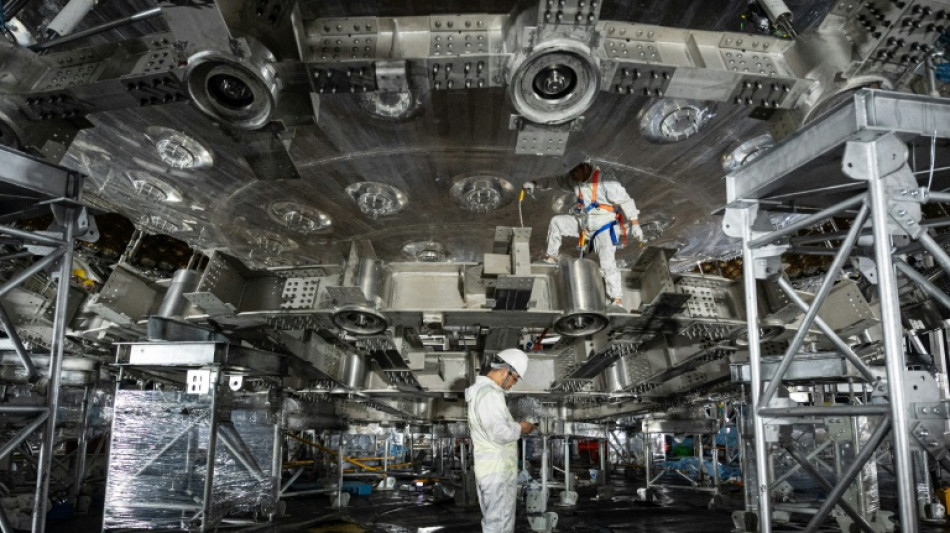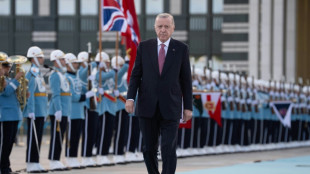
-
 Sinner caps eventful year with ATP Finals triumph over great rival Alcaraz
Sinner caps eventful year with ATP Finals triumph over great rival Alcaraz
-
Portugal book spot at 2026 World Cup as England stay perfect

-
 Hakimi, Osimhen, Salah shortlisted for top African award
Hakimi, Osimhen, Salah shortlisted for top African award
-
Sinner beats great rival Alcaraz to retain ATP Finals title

-
 Schenk wins windy Bermuda Championship for first PGA title
Schenk wins windy Bermuda Championship for first PGA title
-
Crime, immigration dominate as Chile votes for president

-
 Kane double gives England record-setting finish on road to World Cup
Kane double gives England record-setting finish on road to World Cup
-
World champions South Africa add Mbonambi, Mchunu to squad

-
 Greenpeace says French uranium being sent to Russia
Greenpeace says French uranium being sent to Russia
-
'Now You See Me' sequel steals N. American box office win

-
 Argentina beat Scotland after frenzied fightback
Argentina beat Scotland after frenzied fightback
-
Argentina beat Scotland after stunning fightback

-
 Pope urges leaders not to leave poor behind
Pope urges leaders not to leave poor behind
-
Pressure will boost Germany in 'knockout' Slovakia clash, says Nagelsmann

-
 Ecuador votes on hosting foreign bases as Noboa eyes more powers
Ecuador votes on hosting foreign bases as Noboa eyes more powers
-
Portugal qualify for 2026 World Cup by thrashing Armenia

-
 Greece to supply winter gas to war battered Ukraine
Greece to supply winter gas to war battered Ukraine
-
India and Pakistan blind women show spirit of cricket with handshakes

-
 Ukraine signs deal with Greece for winter deliveries of US gas
Ukraine signs deal with Greece for winter deliveries of US gas
-
George glad England backed-up haka response with New Zealand win

-
 McIlroy loses playoff but clinches seventh Race to Dubai title
McIlroy loses playoff but clinches seventh Race to Dubai title
-
Ecuador votes on reforms as Noboa eyes anti-crime ramp-up

-
 Chileans vote in elections dominated by crime, immigration
Chileans vote in elections dominated by crime, immigration
-
Turkey seeks to host next COP as co-presidency plans falter

-
 Bezzecchi claims Valencia MotoGP victory in season-ender
Bezzecchi claims Valencia MotoGP victory in season-ender
-
Wasim leads as Pakistan dismiss Sri Lanka for 211 in third ODI

-
 Serbia avoiding 'confiscation' of Russian shares in oil firm NIS
Serbia avoiding 'confiscation' of Russian shares in oil firm NIS
-
Coach Gambhir questions 'technique and temperament' of Indian batters

-
 Braathen wins Levi slalom for first Brazilian World Cup victory
Braathen wins Levi slalom for first Brazilian World Cup victory
-
Rory McIlroy wins seventh Race to Dubai title

-
 Samsung plans $310 bn investment to power AI expansion
Samsung plans $310 bn investment to power AI expansion
-
Harmer stars as South Africa stun India in low-scoring Test

-
 Mitchell ton steers New Zealand to seven-run win in first Windies ODI
Mitchell ton steers New Zealand to seven-run win in first Windies ODI
-
Harmer stars as South Africa bowl out India for 93 to win Test

-
 China authorities approve arrest of ex-abbot of Shaolin Temple
China authorities approve arrest of ex-abbot of Shaolin Temple
-
Clashes erupt in Mexico City anti-crime protests, injuring 120

-
 India, without Gill, 10-2 at lunch chasing 124 to beat S.Africa
India, without Gill, 10-2 at lunch chasing 124 to beat S.Africa
-
Bavuma fifty makes India chase 124 in first Test

-
 Mitchell ton lifts New Zealand to 269-7 in first Windies ODI
Mitchell ton lifts New Zealand to 269-7 in first Windies ODI
-
Ex-abbot of China's Shaolin Temple arrested for embezzlement

-
 Doncic scores 41 to propel Lakers to NBA win over Bucks
Doncic scores 41 to propel Lakers to NBA win over Bucks
-
Colombia beats New Zealand 2-1 in friendly clash

-
 France's Aymoz wins Skate America men's gold as Tomono falters
France's Aymoz wins Skate America men's gold as Tomono falters
-
Gambling ads target Indonesian Meta users despite ban

-
 Joe Root: England great chases elusive century in Australia
Joe Root: England great chases elusive century in Australia
-
England's Archer in 'happy place', Wood 'full of energy' ahead of Ashes

-
 Luxury houses eye India, but barriers remain
Luxury houses eye India, but barriers remain
-
Budget coffee start-up leaves bitter taste in Berlin

-
 Reyna, Balogun on target for USA in 2-1 win over Paraguay
Reyna, Balogun on target for USA in 2-1 win over Paraguay
-
Japa's Miura and Kihara capture Skate America pairs gold


China's underground lab seeks answer to deep scientific riddle
Far beneath the lush landscape of southern China, a sprawling subterranean laboratory aims to be the world's first to crack a deep scientific enigma.
China has emerged as a science powerhouse in recent years, with the country's Communist leadership ploughing billions of dollars into advanced research to contend with the United States and other rivals.
Its latest showpiece is the Jiangmen Underground Neutrino Observatory (Juno), a state-of-the-art facility for studying the minuscule subatomic particles.
The project is an "exciting" opportunity to delve into some of the universe's most fundamental -- but elusive -- building blocks, according to Patrick Huber, director of the Center for Neutrino Physics at the American university Virginia Tech, who is not involved in the facility's research.
AFP recently joined an international media tour of the observatory in Kaiping, Guangdong province, organised by the Chinese Academy of Sciences, the country's national science agency.
The lab is reached by a funicular train that travels down a tunnel to a cavern built 700 metres (2,300 feet) underground to limit radiation emissions.
Inside stands the neutrino detector, a stainless steel and acrylic sphere around 35 metres in diameter, crisscrossed by cables.
"No one has built such a detector before," Wang Yifang, Juno's project manager and director of the Institute of High Energy Physics, said as workers in hard hats applied the finishing touches to the gleaming orb.
"You can see from the scale, it was technologically complicated," Wang said as he waved a laser pen over different parts of the installation.
Started in 2014, Juno has cost around 2.2 billion yuan ($311 million) to build and is due for completion next year.
It aims to solve a fundamental physics puzzle about the particles' nature faster than scientists in the United States, a world leader in the field.
Its research could also help us better understand planet Earth, the Sun, and other stars and supernovas.
- 'Second means nothing' -
Neutrinos are elementary particles that exist all around us and move close to the speed of light.
Physicists have known about them for decades but still lack in-depth knowledge of how they work.
Researchers will use Juno to detect neutrinos emitted by two Chinese nuclear power plants, each located 53 kilometres (33 miles) away.
They will then use the data to tackle something called the "mass hierarchy" problem, believed to be crucial for improving theories of particle physics.
Scientists already know that neutrinos come in three different mass states, but they don't know which is the heaviest and which is the lightest.
Solving that problem could help them better understand the standard model of particle physics, allowing them in turn to learn more about the past and future of the universe.
"(The project) will deeply test our understanding of neutrino oscillation and quantum mechanics," said Huber of Virginia Tech.
"If it turns out that Juno shows our (current) understanding is wrong, then that would be a revolution."
Wang, the project manager, said researchers were confident they would "get the result of mass hierarchy ahead of everybody".
In fundamental science, he said with a smile, being "the first means everything, and the second means nothing".
- Superpower tensions -
Scientists estimate that six years of data will be needed to crack the mass hierarchy question.
And although similar experiments will take place in the US and Japan in the coming years, Juno is "ahead in the race", said Jennifer Thomas, a physicist at University College London who also sits on the project's International Scientific Committee.
Around 750 scientists from 17 countries are taking part in the collaboration, including "two American groups", according to Wang.
More are interested in joining, he added, "but unfortunately, because of the many well known reasons... they are not allowed to".
As US-China competition over science and technology heats up, Washington has investigated US-based academics of Chinese origin for spying or stealing intellectual property, and it has encouraged domestic institutions to loosen ties with Chinese counterparts.
Beijing, for its part, has been accused by Western governments and international organisations of restricting access to certain data and hindering enquiries into sensitive topics, like the origins of Covid-19.
But one American scholar and member of Juno said he was looking forward to working on the "unique" project.
"We're not completely numb to the political situation, because there can sometimes be difficulties (for researchers) in obtaining visas" and navigating stricter bureaucratic hurdles, Juan Pedro Ochoa-Ricoux, an experimental physicist at the University of California, Irvine, told AFP.
He said such problems "affect both sides, perhaps our Chinese colleagues even more than us in the US".
But, he said, "by working together, we also show how science can and must be apolitical".
X.AbuJaber--SF-PST




